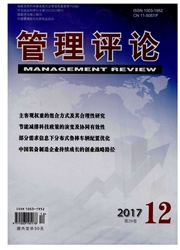

 中文摘要:
中文摘要:
运用实物期权及古典经济学的均衡分析方法,构建模型分析了管理能力不确定性及交易成本差异、潜在经理人能力与知识的企业专用性对企业选择引入职业经理人方式的影响。分析表明:当且当企业对外部经理人管理能力的判断大到其为企业带来的收益达到或超过内部经理人为企业带来的收益、补偿企业支付的超额交易成本及考虑外部潜在经理人管理能力提高的不确定性所增加的等待期权价值之和时,才会采取外部招聘的方式,否则企业将采取内部提拔的方式。进一步的分析表明,如果企业对潜在经理人知识与能力的企业专用性要求较低,企业会更注重经理人的能力,因而会倾向于采取外部招聘方式,而当企业对潜在经理人知识与能力的企业专用性要求较高时,企业更倾向于采取内部提拔方式。文章最后运用模型结果对成功引入职业经理人的典型实例进行了解释,并对我国企业引入职业经理人的方式选择进行了实证分析。
 英文摘要:
英文摘要:
This paper establishes a model to analyze,by using real options and equilibrium analysis method of classic economics,the influence that the uncertainty of management ability,the transaction cost difference and the specificity of potential manager have on the choice of ways to retain professional manager. The analysis shows that,only if an outside manager brings income sufficiently to compensate the total of the transaction cost and the value of real options,the enterprise would choose the way of external recruitment,otherwise it would choose the way of internal promotion. A further analysis shows that,if an enterprise has a low specificity requirement to the potential manager,the enterprise would pay close attention to his ability,thus would choose the way of external recruitment,and if the enterprise has a high specificity requirement to the potential manager,it would choice the way of internal promotion. Finally,this paper makes an explanation by exemplifying some successful cases of appointing professional manager,and makes an empirical analysis of Chinese enterprises'choice of the ways to invite professional managers.
 同期刊论文项目
同期刊论文项目
 同项目期刊论文
同项目期刊论文
 期刊信息
期刊信息
